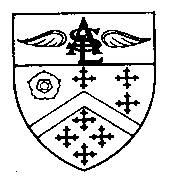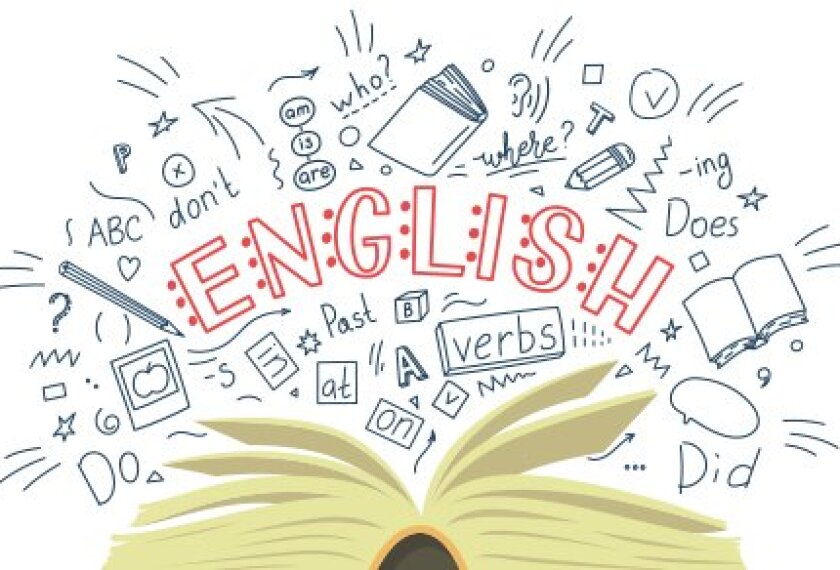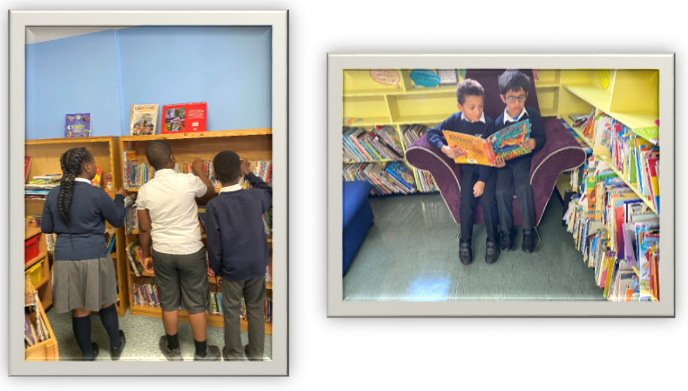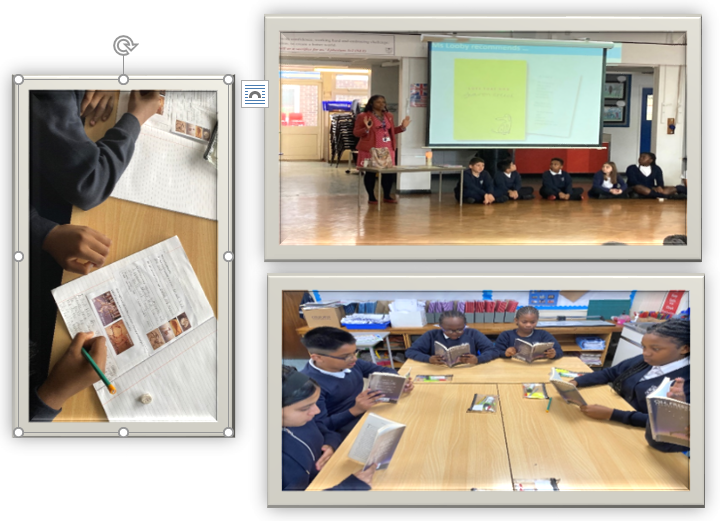English
What we believe
At Latymer All Saints, we believe that English and the teaching of English underpins our curriculum. We intend for all our pupils to be confident, independent learners with high aspirations for their future. Our principal aim is to ensure that all children become primary literate and make progress in the areas of reading, writing, speaking and listening.
The wider curriculum is mainly taught hand in hand with an additional Literacy focus ensuring that children are able to read, access and enjoy their learning in a cohesive manner, making links and converting learning into their long-term memory. Children are immersed in a vocabulary rich learning environment through the use of high- quality texts, these texts are linked to half-termly cross-curricular topics. This ensures that children at Latymer All Saints are exposed to a language heavy, creative and continuous English curriculum where reading and writing are intrinsically linked.
We believe that children need to develop a secure knowledge-base in Literacy, which follows a clear pathway of progression as they advance through the primary curriculum. Stringent assessments and evaluations ensure that we are able to provide focused and targeted support so that all children experience success in literacy. We believe that a secure foundation in literacy skills is fundamental to a high quality education and will give our children the tools they need to participate fully as a member of society.
What we do
We have a rigorous and well organised English curriculum and framework, that provides many purposeful opportunities for reading, writing and discussion We also ensure that our English teaching and learning provides many purposeful opportunities for reading, writing and speaking and listening. We employ a broad array of experiences, quality texts and resources to motivate and inspire our children. We have robust knowledge and skills progression maps in Grammar and Punctuation, Reading Comprehension and Genre progression which inform our yearly overview, medium term plans and consequently our weekly planning.
We aim to provide every child with the key skills they require to develop a love of learning that will be with them for their whole life, through high quality teaching and learning experiences. To achieve this, we use the Essentials Curriculum by Chris Quigley for reading, writing and spoken language. This sets out the essential coverage, learning objectives and standards which are required for all subjects alongside progress measures.
The curriculum builds progressively from EYFS to Year 6 and aligns to the National Curriculum. This is done through Milestones. There are three milestones - Milestone 1 (Years 1 and 2), Milestone 2 (Years 3 and 4) and Milestone 3 (Years 5 and 6). Within each Milestone, children develop the knowledge and transferable skills which allow them to access all areas of the English curriculum.
Coverage of curriculum objectives includes daily phonics in EYFS and KS1. We have just implemented the Little Wandle Letters and Sounds Revised to plan and provide daily engaging phonics lessons. This programme also develops vocabulary and builds systematically on children’s’ existing knowledge. Links are made between known and new vocabulary with discussion about the meaning of words. Children who are identified as requiring further support in phonetic understanding in KS2, also benefit from participation in the programme.
From Year 2, classes follow a progressive spelling scheme. Through exploring spelling patterns and rules, our goal is to create confident and competent spellers using a discrete teaching approach underpinned by phonics. Children are also taught to:
- Spell accurately and identify reasons for mis-spellings.
- Proof-read their spellings
- Recognise and use word origins, families and roots to build their skills
- Use dictionaries and thesauruses.
We hold an annual Spelling Bee competition every spring to promote high standards in spelling across the school. Children are tested on spellings from an age appropriate book. This provides them with an opportunity to compete in a friendly and supportive environment amongst their peers.
We want all of our children to take pride in their presentation and we advocate a cursive/joined-up handwriting style throughout school. We teach Kingston Cursive Handwriting which provides a clear, practical framework for implementing and developing a whole-school handwriting policy.
Children participate in a whole class reading lesson daily and receive interventions as and when required if additional needs are identified. New ambitious vocabulary is pre-taught at the start of each new week allowing children to explore word meaning before it is met in context within the text.
Reading for Pleasure is promoted daily through ‘End of Day’ reading and all year groups’ cross-curricular topic is matched to a quality age appropriate text to excite and engage the children, and to expose them to new and varied vocabulary. Reading at home is encouraged and promoted through class incentives and parental engagement sessions.
Poetry is performed termly, children are given the opportunity to rehearse poems by heart, sharpen and practise their poetry performance skills including confidence, projection, tone of voice and annunciation.
World Book Day is an essential calendar fixture in Latymer All Saints; we recognise how it offers an incredible opportunity to focus on reading for pleasure, supports children's independence in book choice, and embeds a habit of reading that brings a wide range of benefits.
Our Reading Ambassadors support reading across school every week; they have a timetable of children to read with regularly. They share their love of reading anything (newspapers, magazines, comics, sports reports) with other children and help them to choose books from the library that they will enjoy.
We strongly believe in the importance of children becoming competent writers. We understand that writing is a fundamental life skill for effectual communication and as a channel for expression and pleasure. Writing is often connected and intertwined with learning in other areas of the curriculum; this gives children an opportunity to apply their growing knowledge to different genres. Opportunities for writing may also be linked to the children’s class text which helps them to be totally immersed in their reading. Children in our school are taught in vocabulary-rich learning environments, which reinforces their growing understanding of language.
What we achieve
At Latymer All Saints we aim for continued progress, sustained learning and transferrable skills. As all aspects of English are a fundamental part of the curriculum, cross curricular writing standards have also improved and English skills taught in lessons are transferred into other subjects; this allows for consolidation of skills and a deeper understanding of how and when to use identifiable grammar, punctuation and grammar objectives. Writing is moderated in school termly to ensure the relevant progress can be seen across all year groups. Teachers work in phases to moderate work and feedback to colleagues.
To monitor pupil’s attainment and progress, teachers assess all independent writing and record a judgement of where the pupil is working at in relation to the learning objectives and success criteria. These judgements are used to support internal school data which is collected 3 times a year. Formative assessment happens habitually and is attained through targeted questioning during lessons, observations of pupils, review of work and discussions. Key skills and previously taught knowledge are continually revisited during lesson starters; this helps to guarantee that children know more, remember more and can do more. It also offers the opportunity for teachers to assess pupils’ attainment and progress regularly.
We endeavour to celebrate children’s achievements in a variety of ways. This includes whole school displays of writing, celebration assemblies, peer evaluation and whole class discussions. This not only supports pupils’ self-esteem and motivation but raises the profile of the subject throughout the school community.
When children leave Latymer All Saints they have grown in ability and confidence with their writing, reading and oracy. Through exposing children to a broad range of authors and genres they have developed the desire to independently read for pleasure.
Useful website links
Spelling and Grammar
Look, Cover, Write, Check- mobile friendly (ictgames.com)
Spelling - KS2 English - BBC Bitesize
See 'N Spell: Plurals (primarygames.com)
Letters and Sounds, English Games for 5-7 Years - Topmarks
Letters and Sounds, English Games for 5-7 Years - Topmarks
Spelling and Grammar, English Games for 7-11 Years - Topmarks
MC Grammar | Home | Music & Lessons | England (mrmcgrammar.com)
Reading
Oxford Owl for Home: help your child learn at home - Oxford Owl
Stories for kids online and fun games to play | BookTrust
Short stories | LearnEnglish Kids (britishcouncil.org)
Michael Rosen | Official Website
Storytelling - Julia Donaldson
Liz Pichon children's book writer and illustrator creator of Tom Gates
Writing
Writing Prompts | Imagine Forest | Creative Writing Resources for Kids
Story Writing and Storytelling for kids | Super Easy Storytelling
Punctuation - KS2 English - BBC Bitesize



